The Hellraiser movies, ranked
Hellraiser, the supernatural body horror picture upon which genre author Clive Barker made his feature directorial debut and burst onto the scene, premiered just over 35 years ago at the Prince Charles Cinema in London. The film introduced audiences to the alluring, wholly unique villain Pinhead (played by Doug Bradley in the first eight installments), who would soon take his place as one of the most iconic horror characters of all time, and his gang of Cenobites, a crew of sadomasochistic, otherworldly beings who discern not between pleasure and pain.
The story of the Cotton family, who find an attic full of misery when they move into a disappeared relative's home, has spawned nine sequels to date, many of which would try, with varying degrees of success, to recapture the combination of strong story, nightmarish score, and visceral, gory imagery that the first film perfected.
However, with The Night House director David Bruckner's brand new reboot, simply titled Hellraiser, streaming exclusively on Hulu, the venerable franchise might be headed for a brighter (well, in its own way) future. As we herald the next chapter of Pinhead and those who dare open the box, read on for our ranking, from worst to best, of each of the original installments in the Hellraiser franchise.
10. <i>Hellraiser: Hellseeker</i> (2002)
This sixth entry in the franchise is probably the installment everyone considers when they think of a bunk Hellraiser sequel. Rick Bota's film marks the first time that the series took a pre-existing script and worked it into a Hellraiser-adjacent narrative, wherein Kirsty Cotton (Ashley Laurence, reprising her role from the first two movies) is presumably killed in a car crash during the opening scene. Her husband, Trevor (Dean Winters), awakens from a coma to find himself thrust into a terrifying reality that may be of his own creation.
It's a mystery which person decided to set this science-fiction-horror movie in a series of drab cubicles, as if Neo never got out of his office in The Matrix, but in the end it doesn't really matter who did (or didn't) do what. Hellraiser: Hellseeker (arguably the most inane title in the history of the genre) is the definition of asinine. It spends most of its running time treading water, with Winters wandering aimlessly around locations drained of all color and atmosphere and gathering clues to figure out his current predicament. (When the final twist rolls around, you'll likely question why any clue-collecting was necessary.)
Laurence is shamefully wasted in her return to the role that made her name as she's mostly shoehorned into the last twenty minutes of the movie, along with Pinhead (Doug Bradley) himself. Hellseeker plays very much like the brainchild of a corporate committee that has never seen any of the previous Hellraiser films, or possibly any movie ever made.
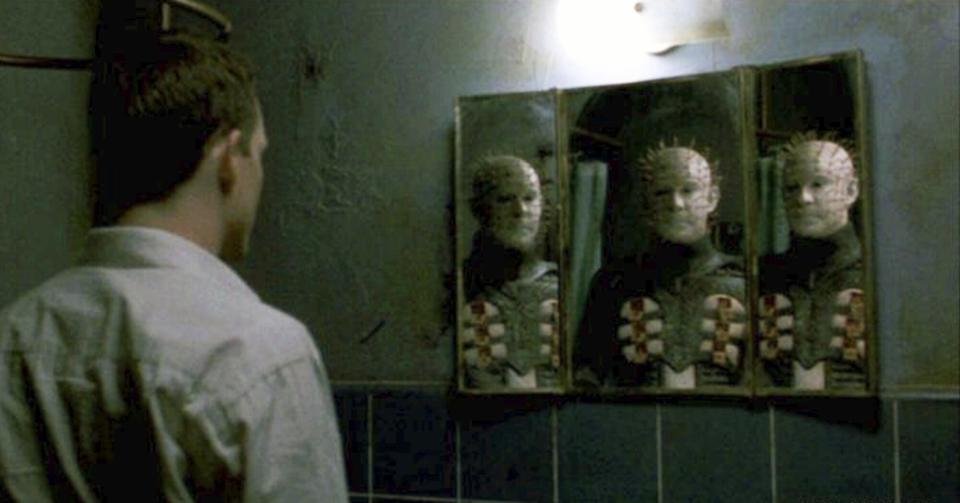
9. <i>Hellraiser: Hellworld</i> (2005)
Sequel number seven is a fascinating animal. Many of the Hellraiser movies from the '90s clearly influenced the Saw franchise, which launched in 2004. Hellworld is the point at which the series begins to cannibalize itself, shamelessly lifting the saturated palette, gory traps, and twisty ending from Saw's playbook and effectively becoming an imitation of an imitation.
Once again directed by Rick Bota (returning for his third time in the director's chair), this entry exists in a universe where Hellraiser is a series of films as well as an online role-playing game (shades of Halloween: Resurrection here), and follows a group of middle-aged "teens" who convene after the suicide of one of their own who became obsessed with the game. Because this is a movie from 2005, they attend a Hellraiser-themed rave, where they are summarily picked off one by one. Whether it's the work of Pinhead, or the creepy host (Lance Henriksen), will not be revealed until the end, though it's fairly obvious from the jump.
Bota's Saw riff is a rather dazzling feat, seeing as Hellworld was released nearly two months in advance of Saw II and preempted many of that series' worst instincts. Enjoyment of Hellworld entirely depends on how fond you are of glossy, marginally performed studio horror from this time, as well as your tolerance for films in which the most entertaining aspects occur by accident. (A choice exposition dump in the opening minutes: "Mike, cenobites don't exist. And even if they do, I never opened the Lament Configuration, which we know isn't real anyway." Hey, thanks for the heads up!)
Hellworld finds Bota attempting to inject the proceedings with a Scream-style meta-comedy that will only flummox its audience. Considering this was released five years after Scream 3 and Jamie Blanks' Valentine, the collective death knell of so-called trendy horror, the tone of this sequel is all the more peculiar. If the intent was to reinvigorate the franchise with a post-modern twist, it could not have been done any less successfully; the comedic flourishes here are so bizarrely out of place that they eventually approach a level of surreal brilliance.
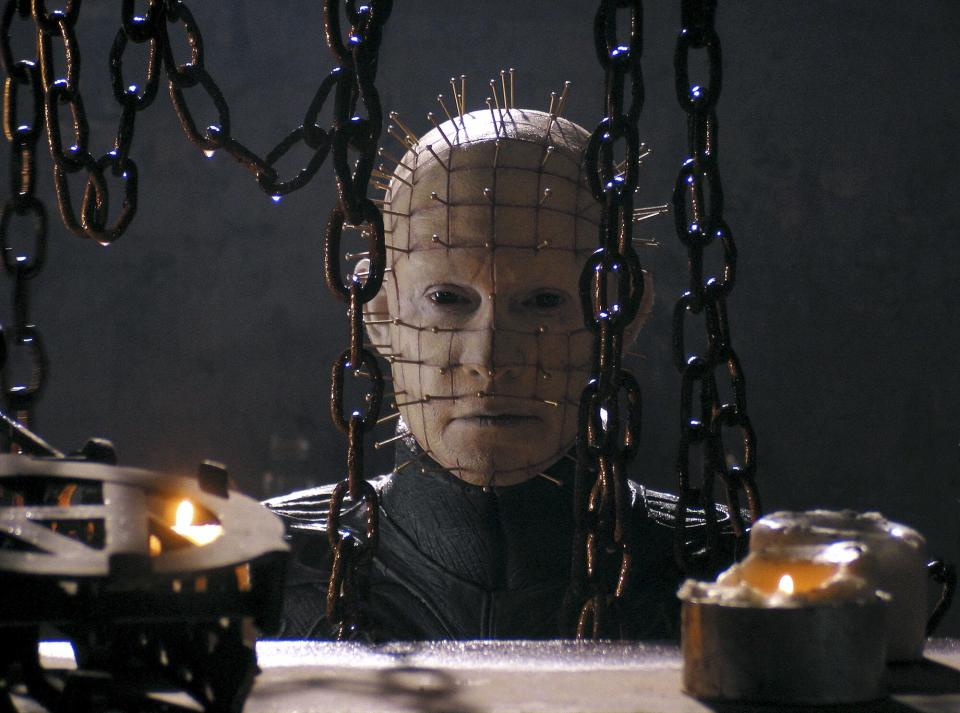
8. <i>Hellraiser: Deader</i> (2005)
Kari Wuhrer stars as Amy, a journalist who is sent to Bucharest to cover a case centering around a Ring-esque video tape that details the reanimation of a member of the Deaders cult. Amy is thrown further into the vortex when she discovers the Lament Configuration, and summons Pinhead into her reality.
Released only three months before the Jigsaw-inflected Hellworld, this entry in the series (also directed by Bota) couldn't be more different from its terminally cheesy successor. If Hellworld feels like a throwback to 1997, at least Deader has a general sense of timelessness to it. This time, the action moves to Romania, and the European locale benefits the atmosphere while harking back to the original two films, which blended their British locations with American influences. While certainly not a perfect addition to the Hellraiser canon, it at least takes itself seriously and musters a taut climax.
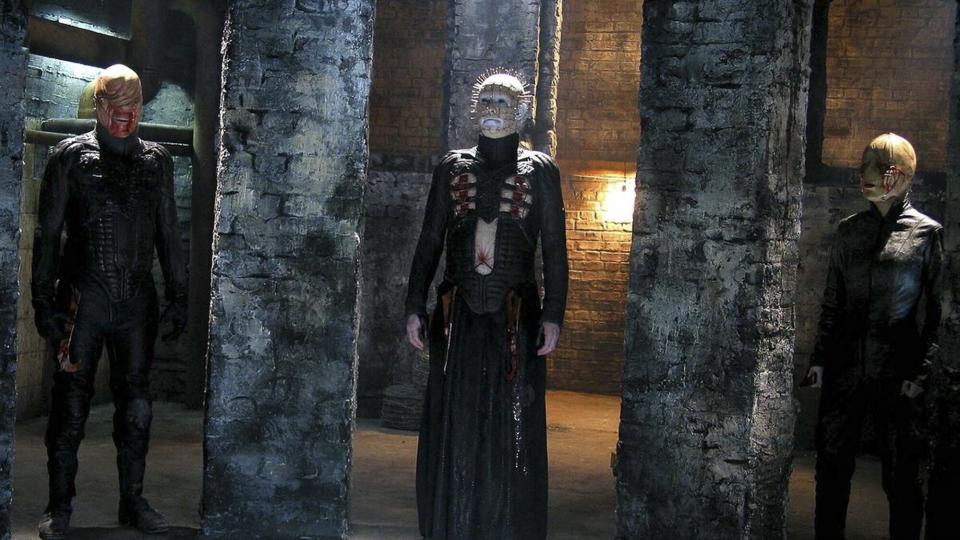
7. <i>Hellraiser: Revelations</i> (2011)
Emma (Tracey Fairaway) is having difficulty processing the circumstances around her brother, Steven (Nick Eversman), and her boyfriend, Nico's (Jay Gillespie) disappearance during a debauched trip to Mexico. At a family dinner between the two bereaved families, Emma finds the mysterious puzzle box amidst her brother's belongings, and summons Steven back to the mortal realm.
Revelations was shot over the course of two weeks, on a budget of just $300,000, with the sole purpose of the production being so that The Weinstein Company could retain rights to the franchise, having not produced a new installment since 2005's Hellworld. This is also the first film in the series to replace Doug Bradley as Pinhead, with Stephen Smith Collins stepping into the role. (Pinhead's voice was dubbed by Fred Tatasciore.) With those qualifications, this should be one of the worst installments in the franchise — instead, it turns out to be the strongest addition to the series in over a decade.
David A. Armstrong's cinematography looks surprisingly rich for the budget, especially when it comes to the effects-heavy scenes, and at just 75 minutes, Revelations absolutely flies by. Director Victor Garcia manages to evoke some of the tone and atmosphere of Barker's original film here, a welcome relief after several sequels of varying quality that drifted further and further from the original spirit of the franchise.
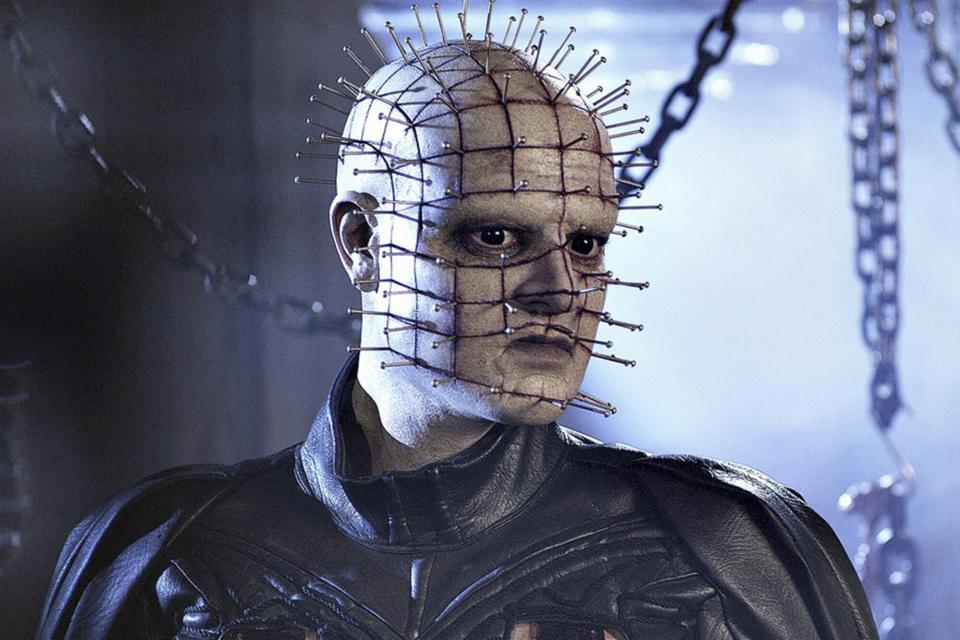
6. <i>Hellraiser: Judgment</i> (2018)
Gary J. Tunnicliffe, who worked as a special effects designer on each of the Hellraiser installments since part three in addition to writing the screenplay for 2011's quickie Revelations, finally takes a stab at directing an installment in Pinhead's legacy with this 10th sequel. Following in the Inferno mold, Detective Carter (Damon Carney) is haunted by Pinhead and the rest of his merry Cenobites after Carter escapes from hell with the Lament Configuration.
Tunnicliffe's film heartily benefits from the director's ongoing relationship with the franchise, though it's equally hampered by its budget. In some ways, Tunnicliffe's vision is the closest the series has come to achieving the sort of netherworldly sights and sounds of a Clive Barker story. (Barker did not have any input on this film.) The scenes set within Pinhead's hellish domain are rendered with ghoulish flare, and are admirably Barker-esque, but the sequences which take place in the "real world" look like any CBS police procedural.
Apparently, the film was not a priority release for The Weinstein Company until the allegations against Harvey Weinstein surfaced, at which point the film was thrown back into post-production and rushed out for a February 2018 release. Had a little bit more care been put into its creation, Hellraiser: Judgment could very well have reinvigorated the franchise. As it is, it's a perfectly respectable film to end the original series on.
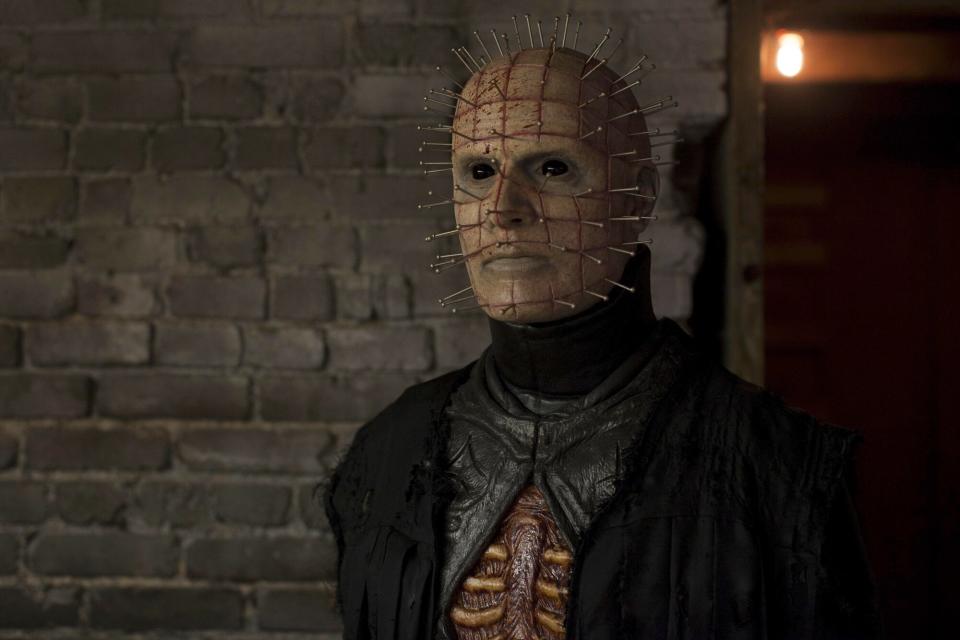
5. <i>Hellraiser: Inferno</i> (2000)
A vast stylistic departure from the previous four films, Inferno is notable for several reasons, chief among them being that it's nowhere near as bad as its reputation would have you believe. Scott Derrickson makes his feature directorial debut here; of course, he's gone on to make some of the most tremendously creepy, and indeed crawly, films of the last many years — The Exorcism of Emily Rose (2005), Sinister (2012), and this year's The Black Phone are highlights, though he also helmed 2016's Doctor Strange for Marvel.
It's a bit surprising how much of Derrickson's directorial promise appears undiluted in this noir-influenced tale of Detective Thorne (Craig Sheffer, who starred in Barker's Nightbreed), a crooked law official who stumbles upon LeMarchand's puzzle box at a crime scene. Of course, it's not long before Pinhead (Bradley) turns up and begins implicating Thorne in a series of killings around the city.
For years, a rumor (possibly started by Bradley himself) persisted that Inferno was never intended as a Hellraiser sequel, and was hastily rewritten to include Pinhead right before production began. Derrickson, however, has disputed this. Inferno was always intended to follow on the heels of the previous four films, though the director and his co-writer, Paul Harris Boardman, made a deliberate attempt to shift the genre.
As such, Inferno is highly reminiscent of 2021's soft-Saw reboot Spiral: From the Book of Saw, in that it combines elements of gory horror and cop procedural in a way that evokes Se7en with less elegance. Derrickson's film takes a great many more chances than Spiral, however, and is a much more fulfilling experience, as it's unafraid to embrace the weirdest elements of the plot. The final half-hour whips itself into such a relentless juggernaut of surrealistic images that it begins to recall David Lynch or Jodorowsky, if they had tried their hand at the home video market.
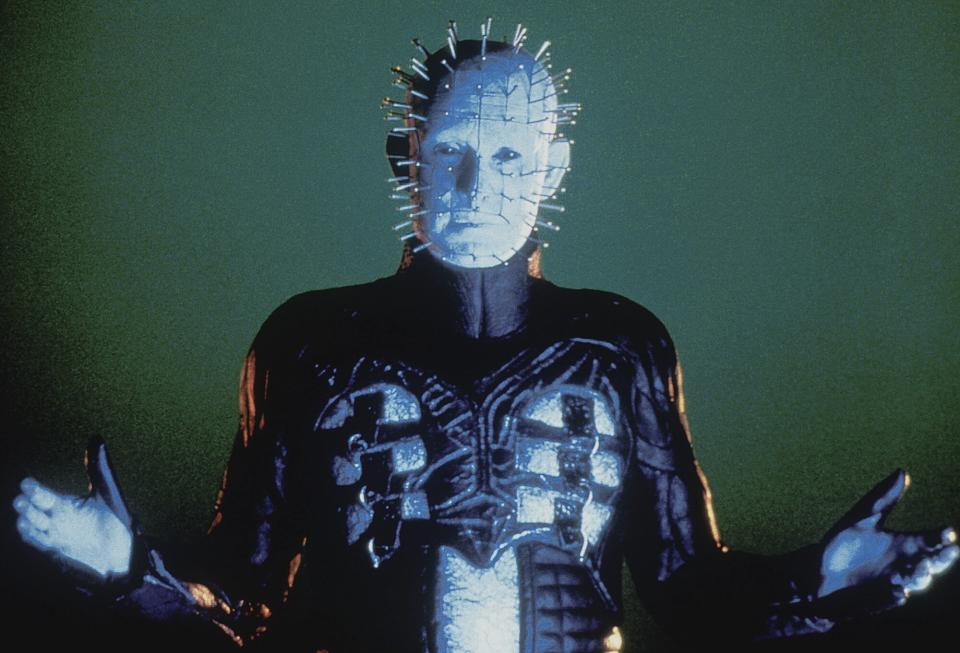
4. <i>Hellraiser III: Hell on Earth</i> (1992)
The spirit of Pinhead is trapped inside of a pillar which makes its way into trendy nightclub the Boiler Room, run by J.P. (Kevin Bernhardt), who then assists Pinhead with his plan to resurrect and use his Cenobites to establish, you guessed it, hell on earth.
Hellraiser III is a perfectly workable transition of the series from outré oddity to mainstream multiplex fodder. Though Clive Barker was initially opposed to director Anthony Hickox's involvement, based on Hickox's past directing comedic-horror films such as Waxwork and its sequel, the young director acquits himself nicely with this more serious story.
In his review for EW, Laurence O'Toole noted that "this ungodly jamboree is, depending on what pew you're sitting in, merely disgusting or grossly anarchic fun." Hell on Earth falls squarely into the latter camp, a nearly perfect balance of Barker's brand of subtextually rich horror and the popcorn thrills that the later Hellraiser sequels pursued.
The central sequence set in the nightclub, featuring Pinhead's reincarnation and subsequent mass-murder of club kids utilizing CD's and stereo wires, (for which Barker himself reportedly directed additional footage), is worth the price of admission alone.
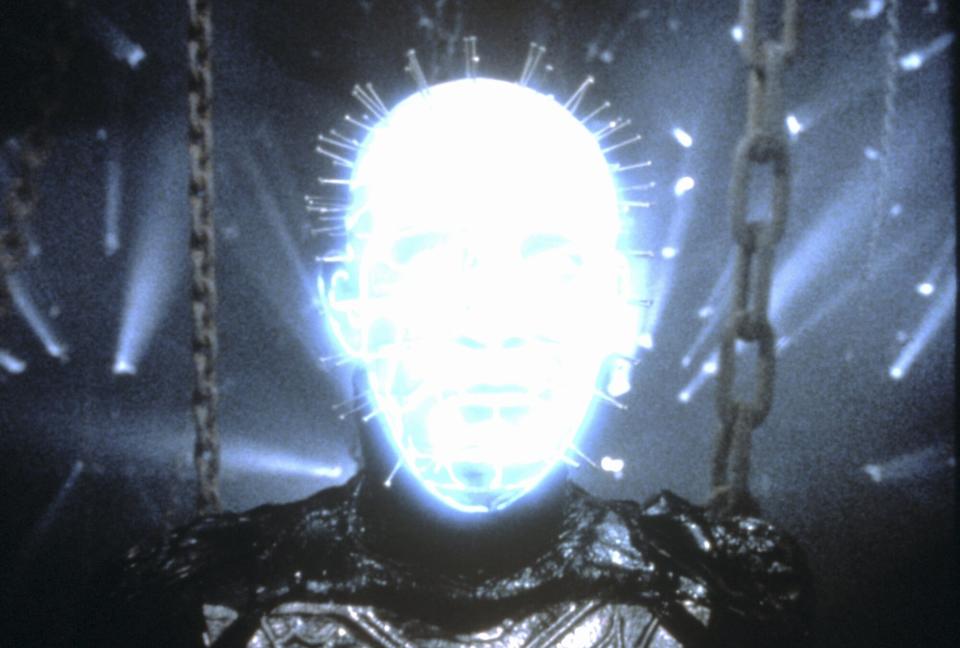
3. <i>Hellraiser IV: Bloodline</i> (1996)
The very same year that Leprechaun made it to outer space, so did Pinhead in this "Alan Smithee" (Kevin Yagher) sequel that splits its focus between an origin story of the Lament Configuration and LeMarchand dynasty, as well as a futuristic strand set aboard a spaceship in 2127.
After studio-mandated changes cut the film down from 110 to 85 minutes, drastically altering the story, director Yagher decided to take the infamous Alan Smithee credit. Reportedly, it was not because he was necessarily opposed to the changes made by the Weinstein siblings.
Rather, by the time the film was finished, Yagher felt it bore such slight resemblance to his original vision that he no longer felt it appropriate to take a directorial credit. (Joe Chappelle, a favorite of Dimension who directed 1995's much-maligned Halloween: The Curse of Michael Myers for the studio, was brought in to direct additional sequences, though ultimately his work was not deemed significant enough to secure him a credit.)
Surprisingly, though, Bloodline is quite an intelligent riff on the source material and undoubtedly one of the most entertaining sequels. This was the last of the Hellraiser films released theatrically, and so it's a bit of a treat to observe the lavish sets here, especially the sequences occurring in the distant past.
In his review of the VHS for EW back in 1996, Owen Gleiberman fairly raved, "Anyone sitting through this in a theater probably fumed over the more incoherent moments, but video's friendlier confines reveal spiffy camera work and careful plotting.
In a rare display of inventiveness, the climactic outer-space chase scene pays off with a surprisingly evil twist, helping to make this the best Alan Smithee film in ages." Indeed, the most frustrating part of Bloodline is when truly brilliant moments pierce the mediocrity and allude to what the film might have been had Yagher been permitted to see his vision through till the end.
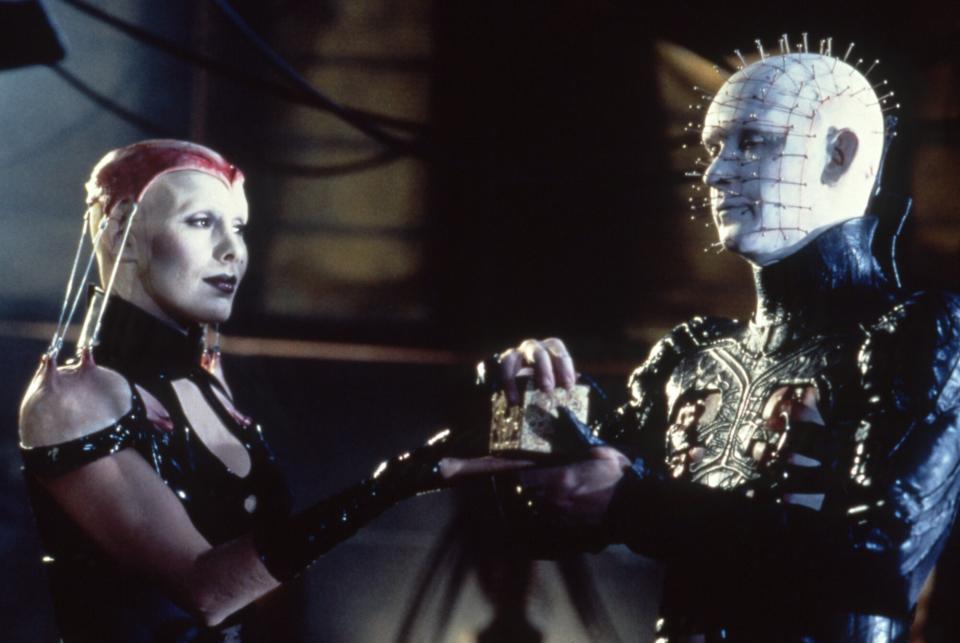
2. <i>Hellbound: Hellraiser II</i> (1988)
Confined to an asylum after the events of the first film, Kirsty (Laurence) is targeted by the psychotic Dr. Channard (Kenneth Cranham). The demented doc resurrects Kirsty's stepmother, Julia (Clare Higgins), who has been stuck in hell alongside Pinhead (Bradley) and the Cenobites since the end of the first film. Kirsty is then pulled into the Cenobite world, and must convince Pinhead to free her.
Director Tony Randel's sequel is very nearly on par with its predecessor in terms of quality, and expands beyond the domesticated setting to give us a view into the hellscape from which Pinhead and his crew emerge. Some concessions are made, seemingly to generate a more diverse audience, but ultimately Hellbound feels in-step with Barker's first film in terms of style, delivery, and all-out strangeness.
Clive Barker had originally envisioned more sequels to star Higgins' Julia, but the actor did not wish to return for another go-around. It's a shame, because Higgins makes for a splendid foil in addition to Pinhead. The special effects are just as shocking as its predecessor, this being the last time that the franchise truly engaged in the imaginatively gory freak-outs of Barker's original.
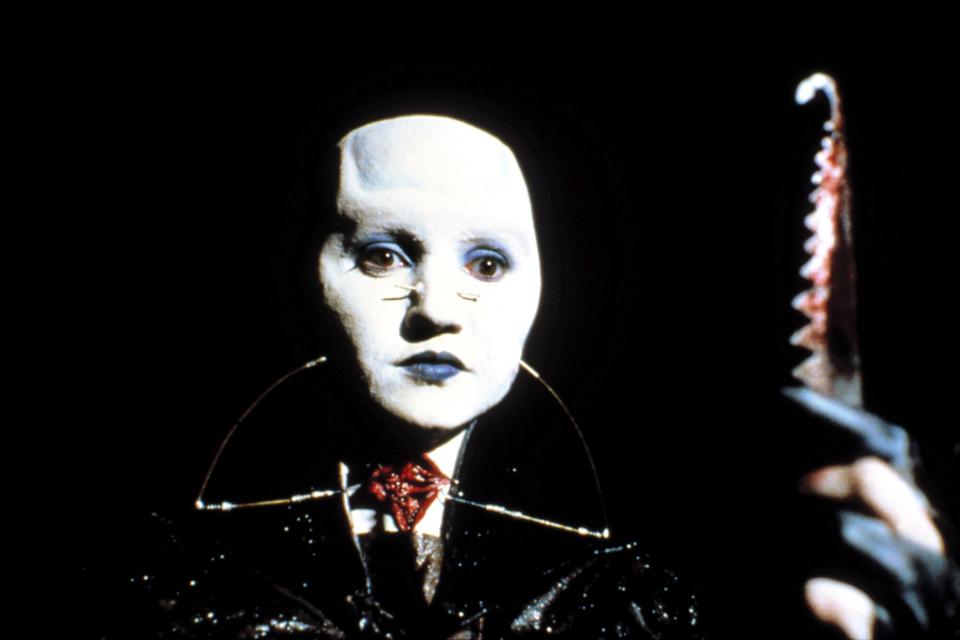
1. <i>Hellraiser</i> (1987)
Clive Barker's directorial debut follows the Cottons — Kirsty (Laurence) and Julia (Higgins), along with father and husband Larry (Andrew Robinson) – as they move to Larry's brother Frank's (Sean Chapman as his human form, and Oliver Smith as "Frank the Monster" later in the film) home, following Frank's disappearance after bringing home the Lament Configuration from an excursion to Morocco and testing it out in his attic.
After a furniture-moving injury causes Larry to spill some of his fresh blood upon the spot where his brother met his maker, the spirit of Frank returns to life in horrifying, skinless form. Julia, who unbeknownst to Larry once had an affair with Frank, begins to bring men from local bars back to the attic to feed his bodily regeneration.
Hellraiser is as close to an absolutely perfect horror film as one could reasonably find. Of the big franchises that kicked off in the '80s, Friday the 13th and A Nightmare on Elm Street, Barker's franchise decisively boasts the finest, most-assured initial film out of the gate. It surpasses the thrills of Elm Street by not only foregrounding the unbelievably icky practical effects (courtesy of Bob Keen), but also by centralizing mature, adult characters in a story that doesn't shy away from its perversities.
Barker walks a tremendously fine line here between the high-mindedness of his writings and a rollercoaster pace that would appeal to audiences in search of popcorn thrills, resulting in a film that satisfies as both a nauseatingly gooey visual effects epic as well as a character drama with an unexpected emotional hook (no pun intended).
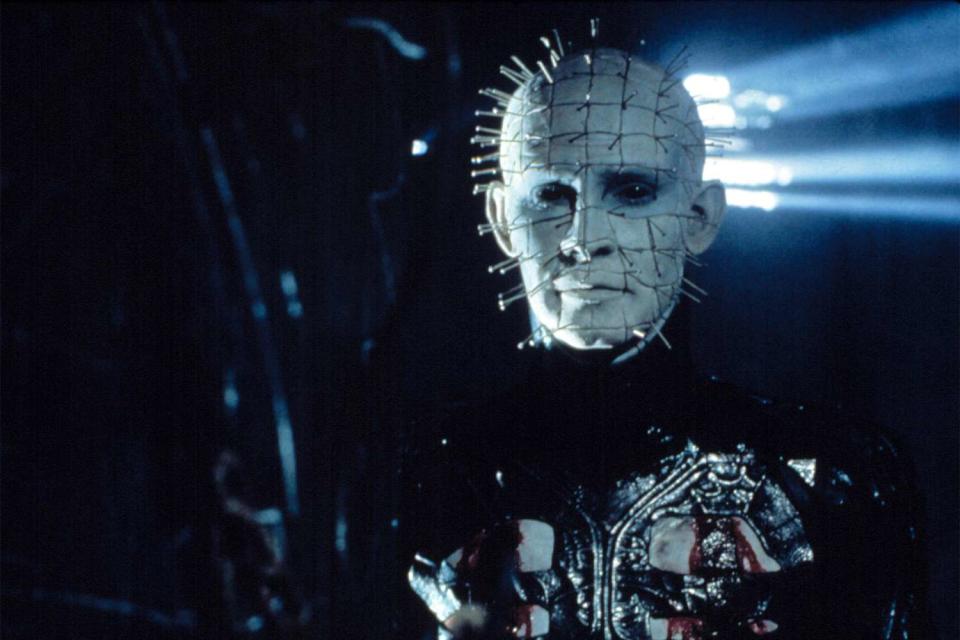
Related content:

 Yahoo Movies
Yahoo Movies 
